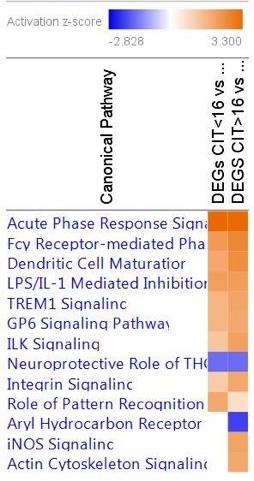Molecular Assessment of Pre-Implantation Donor Biopsies: Effects of Prolonged Cold Ischemia Time and Development of Delayed Graft Function
1Montefiore Medical Center, Bronx
2University of Virginia, Charlottesville
3National University of Ireland Galway, Galway, Ireland.
Meeting: 2018 American Transplant Congress
Abstract number: 409
Keywords: Gene expression
Session Information
Session Name: Concurrent Session: Biomarkers, Immune Monitoring and Outcomes: Basic
Session Type: Concurrent Session
Date: Tuesday, June 5, 2018
Session Time: 2:30pm-4:00pm
 Presentation Time: 3:42pm-3:54pm
Presentation Time: 3:42pm-3:54pm
Location: Room 602/603/604
Background: Deceased-donor (DD) kidneys are at higher risk for ischemia/reperfusion injury leading to increased inflammatory mediators and innate immune response. We aimed to investigate the effects of prolonged cold ischemia (CIT) on intragraft molecular gene expression profiles of DD kidneys comparing to living-donor (LD) pre-implantation biopsies and to investigate the molecular features of DD biopsies that develop delayed graft function (DGF).
Methods: There were 48 pre-implantation kidney biopsy samples (29 LD and 19 DD). The cold ischemia time (CIT) was < 16 hrs in 10 and > 16 hrs in 9 DD kidneys. 9 DD patients developed DGF after transplantation. The gene expression profiles were studied by Affymetrix HuGene 1.0 ST expression arrays.
Results: Ingenuity Pathways Analysis demonstrated that DD pre-implantation biopsies showed increased expression of pathways related to acute inflammatory response, lymphocyte mediated immunity, innate and humoral immune response, complement activation and IL-6 activation. 3 main canonical pathways were activated in DD kidneys (acute phase response signaling, complement system and LPS/LI-1 mediated inhibition). Though most of the genes were common when biopsies with CIT > 16 hrs compared to biopsies with CIT < 16 hrs there were unique genes that were differentially expressed (Figure). The top canonical pathways involved in DDs were exacerbated with increased CIT. There were a few pathways that were activated in CIT>16 hrs group (iNOS signaling and actin cytoskeleton signaling). There were no differentially expressed probe sets when DD biopsies of patients that develop DGF compared to biopsies without DGF.
Conclusions: Pre-implantation DD biopsies showed increased expression of transcripts associated with inflammatory mediators, cytokines, macrophages, and innate immune response compared to LD kidneys. However, increased CIT had slight effect on intragraft gene expression profiles. Molecular analysis of pre-implantation biopsies was similar whether they develop DGF or not.
CITATION INFORMATION: Akalin E., Bao Y., Bontha V., e Silva M., Ajaimy M., [Oacute] Broin P., Mas V. Molecular Assessment of Pre-Implantation Donor Biopsies: Effects of Prolonged Cold Ischemia Time and Development of Delayed Graft Function Am J Transplant. 2017;17 (suppl 3).
To cite this abstract in AMA style:
Akalin E, Bao Y, Bontha V, Silva Me, Ajaimy M, Broin P[Oacute], Mas V. Molecular Assessment of Pre-Implantation Donor Biopsies: Effects of Prolonged Cold Ischemia Time and Development of Delayed Graft Function [abstract]. https://atcmeetingabstracts.com/abstract/molecular-assessment-of-pre-implantation-donor-biopsies-effects-of-prolonged-cold-ischemia-time-and-development-of-delayed-graft-function/. Accessed February 19, 2026.« Back to 2018 American Transplant Congress

